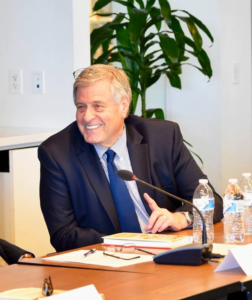Global political and economic conflicts pose a threat to democracy, according to Annie Wilcox Boyajian, the lead advocacy manager at Freedom House, an independent organization that ranks countries based on their freedoms. Boyajian spoke at a panel event called “Leading From Below: Democracy Support in a New Era,” hosted by the Georgetown University Master’s Program in Democracy and Governance on Friday afternoon.
Kenneth Wollack, president of the National Democratic Institute and co-editor of the informational newsletter Middle East Policy Survey, was the event’s keynote speaker. In addition to Boyajian, the panel featured Georges Fauriol, vice president of programs at the National Endowment for Democracy and Thomas Melia, fellow at the George W. Bush Institute and chair of the board of directors of the Project on Middle East Democracy.

Kenneth Wollack, president of the National Democratic Institute said he classified himself as a political optimist despite the current negative trends in worldwide democracy that are causing others in his field to worry.
The event marked the 10th anniversary of Georgetown’s Master’s Program in Democracy and Governance, which was established in 2008 to help students better understand the democratic processes of government and how officials implement policies to achieve their goals.
The experts on democratic freedoms discussed the current state of freedom in the world, specifically noting the impact of President Donald Trump’s election on democracies around the world.
Conflict is not constrained to one area, Wollack said. He referenced the 2018 Democracy Index released Jan. 18 by Freedom House, which showed that the United States’ freedom ranking dropped from previous years.
Freedom House rates countries based on their perceived freedoms on a scale from zero to 100, with 100 being the freest and zero being the least. The United States’ rating fell to 86 in 2018 from 89 in 2017.
“We now know from issues like terrorism, migration flows and disease, that unlike that famous tagline in advertising marketing, what happens in places like [El] Salvador or Syria doesn’t stay there,” Wollack said. “Now there is widespread concern in our community about the Trump administration seeming to retreat from America’s traditional role in advancing global democracy.”
Wollack also expressed fear of the effect Trump’s “America First” foreign policy plan will have on democracy around the world.
“The Freedom House report points to the administration’s skepticism toward international alliances with other democracies, the absence of democracy rhetoric in the president’s public speeches and his stated admiration for some of the world’s strongmen,” Wollack said.
Boyajian agreed that the “America First” foreign policy strategy may create concern about America’s leadership ability, but she was optimistic about the United States’ potential to influence the global community.
“We’re still a huge economic power; we still have enormous soft power,” Boyajian said. “People will still listen to the United States, so I think we have an obligation as a democracy, a co-democracy community, to push the U.S. to do more and to use that strategy and the rhetoric in the strategy to hold the administration accountable.”
Fauriol discussed the importance of “leading from below,” noting that low-power actors play a role in influencing the leadership of an organization. In the context of a democratic society, Fauriol said, “leading from below” is an integral part in promoting democracy.
“For me, the ‘leading from below’ concept is not a new adaptation to the preceding natures to the U.S. democracy assistance policy,” Fauriol said. “Probably one of its continuing elements is that it actually is working from below, that’s its energy — it represents the reality, if you will, of the potential of a democratic society.”
Melia said he was optimistic about the future of global democracy, though he cautioned against a competitive mindset when considering the pursuit of democracy and prosperity.
“If you think that our prosperity in the world is a zero-sum game, it’s dog-eat-dog,” Melia said. “If you think that our prosperity can be shared and our security can be widened if other people have more of that too, then you have a whole different personality.”
Wollack also said he classified himself as a political optimist despite the current negative trends in worldwide democracy that are causing others in his field to worry.
“I confess to being an incurable optimist who for 32 years has worked in the optimism business,” Wollack said. “Given the negative trends over the past decade, a period of time that coincidentally spanned the existence of this program, I, like my chairman Madeleine Albright, remain an optimist but I can see optimists who are now worried a lot.”




















